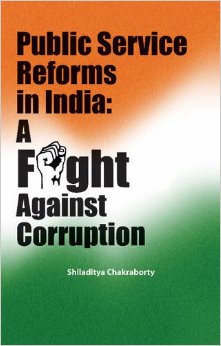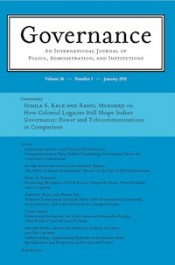Why it’s tough to stop the abuse of governmental resources for political purposes
 There have been scandals in many advanced democracies about politicians’ abuse of governmental resources for party-political purposes. But can anything be done about this? In the current issue of Governance, Nicole Bolleyer and Anika Gaujaprovide a framework for thinking about the problem, and reasons for skepticism about the possibility of effective regulation. “Institutional functions cannot be clearly separated from party-political functions in parliamentary systems,” they argue. “The much observed increasing regulation of party actors might be less constraining for them in practice than is commonly assumed.” Read the article.
There have been scandals in many advanced democracies about politicians’ abuse of governmental resources for party-political purposes. But can anything be done about this? In the current issue of Governance, Nicole Bolleyer and Anika Gaujaprovide a framework for thinking about the problem, and reasons for skepticism about the possibility of effective regulation. “Institutional functions cannot be clearly separated from party-political functions in parliamentary systems,” they argue. “The much observed increasing regulation of party actors might be less constraining for them in practice than is commonly assumed.” Read the article.Better service delivery might not improve the legitimacy of fragile states
 In the current issue of Governance, Claire Mcloughlin challenges the conventional wisdom that the provision of vital public services will always improve the legitimacy of a fragile or conflict-affected state. Many factors, such as shifting understandings about the role of the state and the ease of attributing performance to state entities, affect judgements about state legitimacy. It follows that legitimacy may not be enhanced by the “‘one-size-fits-all’ modus operandi of state-building” favored by some development agencies. Open access to the article. Andlink to research citing this article.
In the current issue of Governance, Claire Mcloughlin challenges the conventional wisdom that the provision of vital public services will always improve the legitimacy of a fragile or conflict-affected state. Many factors, such as shifting understandings about the role of the state and the ease of attributing performance to state entities, affect judgements about state legitimacy. It follows that legitimacy may not be enhanced by the “‘one-size-fits-all’ modus operandi of state-building” favored by some development agencies. Open access to the article. Andlink to research citing this article.How ethics experts bolster technocratic power
 In the current issue of Governance, Annabelle Littoz-Monnet examines the role of ethics experts who serve on advisory committees for controversial issues within the European Union’s policymaking process. Such committees are often portrayed as “sites of democratization”, Littoz-Monnet says. In practice, however, the effect is exactly the opposite. “Making ethics a matter of expert judgment . . . enables bureaucrats to assert their grip on issues that would normally be solved via the democratic route . . . [and] conceals which ethics and whose values prevail in EU politics.” Read the article.
In the current issue of Governance, Annabelle Littoz-Monnet examines the role of ethics experts who serve on advisory committees for controversial issues within the European Union’s policymaking process. Such committees are often portrayed as “sites of democratization”, Littoz-Monnet says. In practice, however, the effect is exactly the opposite. “Making ethics a matter of expert judgment . . . enables bureaucrats to assert their grip on issues that would normally be solved via the democratic route . . . [and] conceals which ethics and whose values prevail in EU politics.” Read the article.
Seven pieces of advice for prospective authors
Our updated page of advice for prospective authors is provided here. Contact the editors directly at governance.online@gmail.com if you have questions about possible contributions.
Weaver: Getting compliance with government policies
 Many government policies work only if citizens or corporations comply with their requirements. But what determines whether citizens or corporations will comply? In Governance, Kent Weaver proposes a comprehensive framework for understanding compliance problems. Weaver says that it is important for policymakers to think carefully about the barriers to compliance that may be operating at a particular place and time, and accommodate heterogeneity in the character and circumstances of the target population. Read the article.
Many government policies work only if citizens or corporations comply with their requirements. But what determines whether citizens or corporations will comply? In Governance, Kent Weaver proposes a comprehensive framework for understanding compliance problems. Weaver says that it is important for policymakers to think carefully about the barriers to compliance that may be operating at a particular place and time, and accommodate heterogeneity in the character and circumstances of the target population. Read the article.
Green wins Levine Book Prize
 Professor Jessica Green of New York University has won the 2015 Levine Book Prize for Rethinking Private Authority: Agents and Entrepreneurs in Global Environmental Governance, published by Princeton University Press. The prize committee says “This fascinating book is a decisive contribution to the governance debate as it investigates the emergence, growth, and influence of private actors in global environmental and climate governance.” Read more about the Levine Prize.
Professor Jessica Green of New York University has won the 2015 Levine Book Prize for Rethinking Private Authority: Agents and Entrepreneurs in Global Environmental Governance, published by Princeton University Press. The prize committee says “This fascinating book is a decisive contribution to the governance debate as it investigates the emergence, growth, and influence of private actors in global environmental and climate governance.” Read more about the Levine Prize.
Book reviews: Corruption in India, financial governance in Africa
 In the current issue of Governance, Jon Quah reviews Public Services Reform in India: A Fight Against Corruption by Shiladitya Chakraborty. “Corruption remains a serious problem” despite decades of anti-corruption efforts in India, Quah observes. While this book provides useful historical analysis, it may disappoint specialists looking for fresh approaches to corruption control. Read the review.
In the current issue of Governance, Jon Quah reviews Public Services Reform in India: A Fight Against Corruption by Shiladitya Chakraborty. “Corruption remains a serious problem” despite decades of anti-corruption efforts in India, Quah observes. While this book provides useful historical analysis, it may disappoint specialists looking for fresh approaches to corruption control. Read the review.